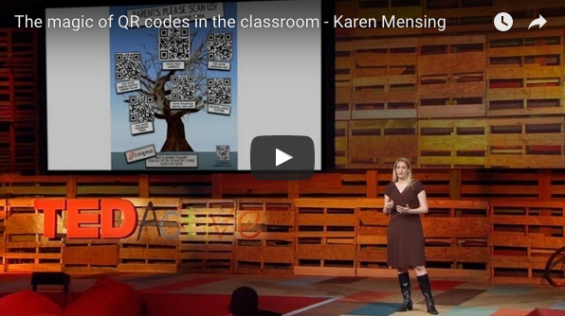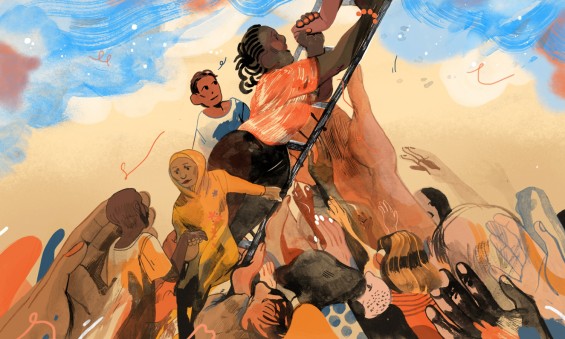
The big benefits of small talk
Casual conversations can sometimes lead us to moments of real connection. News director and radio host Kyle Kellams explains how.
Small talk is seen by many of us as the cotton candy of conversation: artificial, unsubstantial and ultimately unsatisfying.
“How many times have you heard, or maybe you’ve said to yourself, ‘I hate small talk’?” asks Kyle Kellams, a Fayetteville, Arkansas, news director and radio host. But he believes that it can serve as the gateway to real understanding.
One “small talk” question that he frequently asks guests in the KUAF studio is: “What’s the first movie you ever saw in a movie theater?” Part of the reason he poses this particular query is technical — he’s testing the sound level of people’s voices on the microphone — but that’s not all. He says, “Sometimes that question leads to an interesting conversation.”
Here’s an example of what he means. One guest’s answer was Jaws, which surprised him because he guessed she must have been quite young at the time. He recalls, “So I asked her — I had to — ‘Who took you as a kid to see Jaws?’ She was kind of sheepish and finally said, ‘My dad.’ Well, that led us to a brief conversation about sharks, about fear, and about, for her, growing up the kid of divorced parents. Then we went away and had the regular conversation about the topic we were scheduled to, and I think it went slightly better because we had actually made a connection.”
Small talk, Kellams emphasizes, isn’t about exchanging idle nothings. It’s a way of forging bonds with people who may appear to have little in common with you. “I think that’s what small conversations can do,” he says. “If you get to know someone just a little bit, it’s harder to yell at them or insult them even if you’re politically polar opposites.”
Small talk can also be a gift that we give each other.
While traveling as a play-by-play announcer for the Arkansas women’s basketball team, Kellams found himself at the bar of a hotel restaurant one evening. He says, “This woman comes up and sits down. She sits down heavy, like [she feels] the weight of the world … She looks over at me and says, ‘How you doing?’ What do you say 99 percent of time when you’re asked that? ‘Good.’ Then you say, ‘How you doing?’ and 99 percent of the time the response is that she’s doing fine too. But she said, ‘Not so good.’”
At the moment, Kellams had a choice. He could politely tell her he had something he had to attend to and retreat to his hotel room, or he could engage. He says, “Filled with nothing to do — I’ve seen every Law and Order — I said, ‘Well, what’s the problem?’ She ends up telling me she was there for her mom’s funeral. Her mom and her had been estranged for decades, if not their entire life. The siblings were [also] estranged from the mother … but she was the oldest so she had the chore of coming to take care of the funeral and any probate. She wasn’t happy about it. For about the next 15 or so minutes, she talked about the childhood she never had, the family she would see on television that she didn’t have and she just missed that. It made her angry and made her melancholy, it made her sad, but that’s … the hand that had been given to her.”
When her take-out order was ready and it was time for her to leave, Kellams offered his sincere hopes that things would get better. He recalls, “She said, ‘Well they’re not going to, but the last 20 minutes have meant the world to me,’ and it really made me feel good if it had made her feel good.”
By “small talk,” Kellams adds, “I’m not talking about, ‘Hey, isn’t that strange weather?’ followed by a few moments of awkward silence and scuffling of feet.” You should probably also refrain from asking “What do you do?” since that question tends to keep things at a superficial level. Instead, you can borrow Kellams’ movie-theater question, or come up with your own. Maybe it’s “What’s the first book you remember reading by yourself?” or “What’s your favorite vegetable?” Think about what could elicit vivid memories or fervent opinions or what you’d be genuinely interested in finding out.
But remember, you’re not there to simply collect their answer and depart. You’re there to receive it like the gift that it is, and respond wholeheartedly. As radio host Celeste Headlee likes to say, “A good conversation is like a game of catch.” Just as you wouldn’t interrupt catching and throwing a ball or Frisbee with a friend to check your phone or look for someone more interesting, commit yourself to following the small talk wherever it may lead.
Watch his TEDxFayetteville talk here:
ABOUT THE AUTHOR
Mary Halton is Assistant Ideas Editor at TED, and a science journalist based in the Pacific Northwest.
This post was originally published on TED Ideas. It’s part of the “How to Be a Better Human” series, each of which contains a piece of helpful advice from someone in the TED community; browse through all the posts here.




